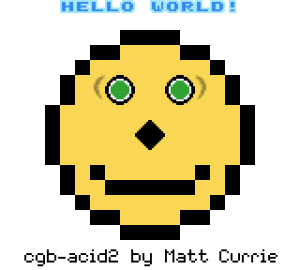More actions
| cgb-acid2 | |
|---|---|
 | |
| General | |
| Author | Matt Currie |
| Type | Test Roms |
| Version | 1.1 |
| License | MIT License |
| System | CGB |
| Last Updated | 2020/04/14 |
| Links | |
| Download | |
| Website | |
| Source | |
cgb-acid2 is a test for developers of Game Boy Color emulators to verify their emulation of the Game Boy Color's Pixel Processing Unit (PPU).
For testing the Game Boy (DMG) you can try dmg-acid2.
User guide
Emulator requirements
A simple line based renderer is sufficient to generate the correct output. This is not a PPU timing torture test requiring T-cycle accuracy, and does not perform register writes during the PPU's mode 3.
The test uses LY=LYC coincidence interrupts to perform register writes on specific rows of the screen during mode 2 (OAM scan).
Double speed mode and WRAM banking emulation are not required.
Image components
Hello World!
The "Hello World" text is constructed from 10 objects, and the exclaimation mark is part of the background. There is also an additional solid white object where the exclaimation mark is. Due to the 10 object per line limit, the solid white object should not be drawn, allowing the background to show through.
Eyes
The eyes consist of four background/window tiles using the same tile data that is flipped vertically and/or horizontally. The top left corner of the eye contains the unflipped tile.
The left eye is drawn using the background, and the right eye is drawn using the window (and also the right edge of the head beside the right eye). At the bottom of the eye, the WX register is set to an off-screen value, so the window is hidden until the WX register is set again for drawing the right side of the chin.
The background/window tiles for the top left corner of both eyes use red for color 0. A green object is positioned overlapping it with OBJ-to-BG Priority (bit 7) set in the OAM flags, so the green object only shows through color 0 of the background/window tile and replaces the red color.
The background/window tiles for the top right corner of both eye use red for color 0 with BG-to-OAM Priority (bit 7) set in the background map attributes. A green object is positioned overlapping it, so the green object only shows through color 0 of the background tile and replaces the red color.
Nose
The nose consists of four objects using the same tile data that is flipped vertically and/or horizontally. The top left corner of the nose contains the unflipped tile. The tile data comes from VRAM bank 1.
The background tiles behind the nose have BG-to-OAM Priority (bit 7) set in the background map attributes, however for this section of the screen the Master Priority (bit 0) of LCDC has been reset, so the objects are always on top regardless of the background map attribute setting.
Mole
The mole is not visible in the reference image, but can be seen in the failure case image for Object Priority Mode (DMG/CGB).
This part of the test consists of two overlapping objects: a blank yellow square, and a black dot/"mole". The blank yellow square object OAM entry is before the mole, so effectively covers the mole even though the mole object has a lower X coordinate.
Mouth
The mouth consists of eight 8x16 objects. The left and right edges of the mouth contain unflipped tile data, and other objects use vertically flipped tile data.
For the left side of the mouth, the objects specify tile index 6, and the right side of the mouth specify tile index 7. Because bit 0 of the tile index is ignored for 8x16 objects, the whole mouth effectively uses tile index 6.
Chin
The right side of the chin is drawn using the window. After the right eye was drawn, the window was hidden by setting WX to an off-screen value. For the right side of the chin, the WX value is restored to an on-screen value. After the chin has been drawn, the window is disabled using bit 5 of the LCDC register so the window does not cover the footer text.
For the right side of the chin, the window has been updated to use the tile map from the VRAM beginning at $9800. Because 16 rows of window have already been drawn for the eye, the right side of the chin is rendered starting from address $9840.
Footer Text
For the footer text, the background is set to use the $9c00-9fff region for the map data, and tile data is set to come from the $8800-97ff region.
Failure Examples
See the example table for some incorrect behaviour and the corresponding attribute/flag.
Compatibility
v1.1
- A minor update to add a software breakpoint for automated testing, and to relocate some register writes that sneaked into mode 3.
v1.0
- Initial Release.
Credits
Håkon Wium Lie and Ian Hickson for creation of the original Acid2 web standards compliance test.
